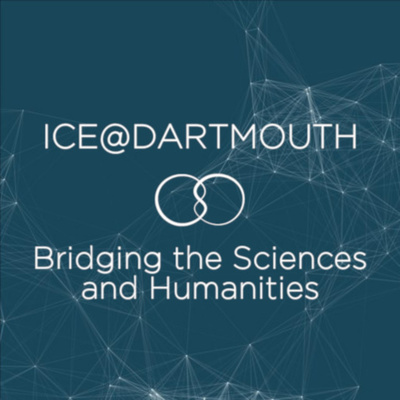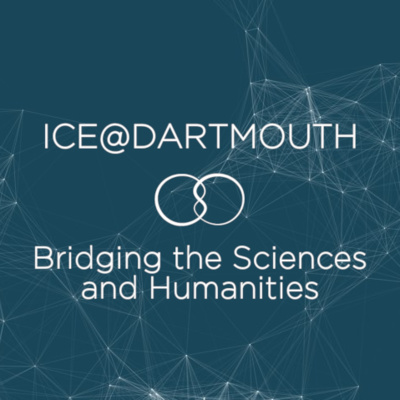
ICE@Dartmouth Podcast
By Franklin Jacoby
In each episode the host, Franklin Jacoby, will converse with one of the past fellows of ICE about their work.

ICE@Dartmouth PodcastOct 12, 2020

While We Wait for the World’s End
For his most recent book, Notes from an Apocalypse, Mark O’Connell traveled around the world, visiting people and visiting places. He documents an attempt to come to grips with how a fear about the end of the world has affected the lives of different people and shaped different landscapes. It is a surprisingly complex topic that touches on not only the environment, but also race, gender, class, wealth, and modern society. For this episode, we’re going to talk about this expansive project and about how he has welded a variety of notes into a single book about our 21stcenturies fears for the future.

A Moment in Time: Thinking about Chronology in Physics and the New Testament
Theoretical physics and religion are not obviously related in any precise or close way. And yet they have fed one another fruitfully in different ways and at various times throughout history. Today I’m going to get a glimpse of that productive exchange by talking to Dr Emanuele Ciancio about two concepts of time in the New Testament and in theoretical physics.

Clouds Across Our Galaxy: A Conversation with David Grinspoon about Earth and Alien Climates
Earth's climate and atmosphere are incredible: they allow us to live and breath in a relatively stable and comfortable environment. Even though they are less hospitable, other objects in our solar system also have atmospheres and climates and we can learn a lot about our own planet and how it is changing by studying these alien systems. Dr David Grinspoon is an expert comparative planetologist, as well an author and public speaker. We're going to talk about the study of alien planets, climate change, and how to be a responsible scientist in the age of climate change and science skepticism.

Signals, Communication, and Science: Damian Sowinski on Using Information Theory to Understand the World
Information Theory is a fundamental part of modern computing and communication that helps us better send, receive, and interpret signals. It's been with us in some form since the early 20th century and without it, modern conveniences like talking on the phone, listening to the radio, or placing an online order may look very different or not even be possible. But Information Theory can offer us much more than a few modern conveniences. It may also help us better understand how to think, learn, and do science.
In this episode, I'm going to talk with Dr Damian Sowinski first about what this theory is, and then what it might be able to tell us about how we can both study and better understand the world around us.

The Many Forms of the Divine: A Conversation with Mary-Jane Rubenstein on Pantheism, Nature, and Science
Most of us probably associate the divine with the Christian God, or at least with a monotheistic, anthropomorphized God, but of course this is not the only way to think of divinity and one fascinating and controversial alternative is pantheism, the view that the material world, universe, or nature is what is divine. Thinking of divinity in this way has enormous implications for all sorts of aspects of human life and I'm going to speak with Dr Mary-Jane Rubenstein about how to make sense of pantheism in the world today and what some of its implications are.

Narrating Science: A Conversation with Tasneem Husain about Fiction, Storytelling, and Understanding Science
How do you talk to people about science? This should be easy, after all science seems to be about facts, evidence, and uncovering truths about the natural world. But of course it is not easy and we can find ourselves in the midst of controversies, especially when scientific findings suggest we should modify our behavior or adjust our habits. Partly we face this difficulty because science can be very difficult to understand and describing how science works (not just what scientists say we should do) is hard to do concisely.
Few forms of expression are as well equipped for handling complex topics as literature. If there is a sure way to talk about science effectively, it must certainly involve storytelling. For this episode, I'll be talking with Dr Tasneem Zehra Husain about her work as a writer and as a scientist and about how fiction can transform science into something we can apprehend .

Money, Markets, Myths, and Politics: Graham Hubbs on the Nature of Money
We use and talk about money all the time and mostly we have no need to actually have a theory of money. After all, as long as I can use it to pay for goods and as long as I get paid, does it really matter? It does. There are actually a number of controversies surrounding money that might be better understood if we could first say precisely what money is. For instance, what role should the government play in regulating money? Is money just another commodity like bread or oil? Is money best regulated by the market? For this episode, I'll speak with the philosopher Dr Graham Hubbs about what money is and why it is so important for us to know.

Perceptions of Science: A Conversation with Salman Hameed about Science and Religion Across the World
Different people across the globe have a variety of perceptions of science that range from trust and admiration, to suspicion, ignorance, and indifference. Understanding these perceptions and why people have them is a fascinating and increasingly important subject of study, particularly if we want to make scientifically informed decisions about difficult and complex problems. In this episode, I'll talk with Dr Salman Hameed about his work studying the perception of science and its relation to religion, especially in different Muslim communities around the world.

Earth as Seen from the Stars
Astronomers typically study distant stars and planets. This in fact seems something like the definition of what an astronomer is. However, studying other parts of the universe might also give us insight into the nature of planet Earth and our time on it, brief though it is compared with the history of our small galaxy. These are some of topics I'll chat with Dr Adam Frank about, who is an astronomer doing some very interesting work on distant stars, but who also has keen interests in life on Earth.

Thinking about Thought: Evan Thompson on Embodied Cognition, neuroscience, and Phenomenology
Providing a theory of the mind that tells us what it is, how it works, and how it relates to the brain or body is an intensely difficult project. Thinkers have been struggling with it for thousands of years. It is no less difficult a project today, but recent work that brings insights from different disciplines, cultures, and schools of thought is offering us the chance to think about the mind in novel and fruitful ways. This is exactly what Dr Evan Thompson is doing and we are going to talk about how he is doing it in this week's episode.

Why Have Morality? A Conversation with Eric Campbell
We make moral judgements all the time, every time we say something is good, bad, evil, or right. Despite their ubiquity, we do not usually stop to wonder whether making moral judgments is a good thing. Nor do we typically even ask what the point of making a moral judgement is. These are some of the questions that those who study ethics pose, especially in the sub-field of meta-ethics. I'm going to talk to Dr Eric Campbell about some of these tricky questions about moral systems and how we might think about them differently and a little more deeply.

Stars and Myths: A Conversation with Tony Aveni
Over many millennia, different cultures have told many different stories, and held many different beliefs about, the stars. Studying these different belief systems is part of what archaeoastronomers, or cultural astronomers, do. In the process, they give us the opportunity to not only learn what others have thought or believed about the sky, but also to explore our own relationship with the sky and with science more generally. These are some of the things I will talk with Dr Tony Aveni about in this episode.

Representing Reality: A Conversation with Gabriel Rabin
Philosophers use representation as a way to understand how we can talk, think, and describe the world around us. But how does representation work? It is difficult to say precisely and a satisfactory answer is made more elusive by our varied means of representation, which can range from pictures and photographs to verbal descriptions, texts, and many, many other forms. How do we use all these different systems to represent reality?
Dr Gabriel Rabin is a philosopher who studies some of these problems and in this episode, we're going to talk in particular about analogue representation and how it works.

The Nature of Time in Modern Physics: A Conversation with Philipp Höhn
What is the nature of time? Contemporary physics is one field to wrestle with this question. This episode explores the challenges of understanding time in contemporary physics through a conversation with Philipp Höhn, who works on reconciling quantum mechanics and general relativity, particularly with respect to time.

Why the Sciences and Humanities Must Speak to One Another: A Conversation with Marcelo Gleiser
For our first full length episode, Franklin Jacoby will chat with the director of ICE@Dartmouth, Marcelo Gleiser, about what the institute is and why their work is so important.

Introduction to the ICE@Dartmouth Podcast
In this first episode, the host, Franklin Jacoby, will introduce the Institute for Cross-Disciplinary Engagement at Dartmouth (ICE@Dartmouth) and discuss how their fellows program is making important contributions to not only the sciences and humanities, but also to some of the deep questions and issues we face as people. In later episodes he'll converse with the director, Marcelo Gleiser, and then with past fellows of the Institute.